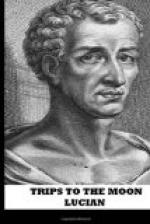{66b} Here doctors differ. Several of Thucydides’s descriptions are certainly very long, many of them, perhaps, rather tedious.
{67} Lucian is rather severe on this writer. Cicero only says, De omnibus omnia libere palam dixit; he spoke freely of everybody. Other writers, however, are of the same opinion with our satirist with regard to him. See Dions. Plutarch. Cornelius Nepos, etc.
{69} Alluding to the story of Diogenes, as related in the beginning.
{75} See Homer’s “Odyssey.”—The strange stories which Lucian here mentions may certainly be numbered, with all due deference to so great a name, amongst the nugae canorae of old Homer. Juvenal certainly considers them in this light when he says:—
Tam vacui capitis populum Phaeaca putavit.
Some modern critics, however, have endeavoured to defend them.
{77} Here the history begins, what goes before may be considered as the author’s preface, and should have been marked as such in the original.
{79} Among the Greek wines, so much admired by ancient Epicures, those of the islands of the Archipelago were the most celebrated, and of these the Chian wine, the product of Chios, bore away the palm from every other, and particularly that which was made from vines growing on the mountain called Arevisia, in testimony of which it were easy, if necessary, to produce an amphora full of classical quotations.
The present inhabitants of that island make a small quantity of excellent wine for their own use and are liberal of it to strangers who travel that way, but dare not, being under Turkish government, cultivate the vines well, or export the product of them.
{81a} In the same manner as Gulliver’s island of Laputa.—From this passage it is not improbable but that Swift borrowed the idea.
{81b} The account which Lucian here gives us of his visit to the moon, perhaps suggested to Bergerac the idea of his ingenious work, called “A Voyage to the Moon.”
{82a} Equi vultures, horse vultures; from [Greek], a horse: and [Greek], a vulture.
{82b} Lucian, we see, has founded his history on matter of fact. Endymion, we all know, was a king of Elis, though some call him a shepherd. Shepherd or king, however, he was so handsome, that the moon, who saw him sleeping on Mount Latmos, fell in love with him. This no orthodox heathen ever doubted: Lucian, who was a freethinker, laughs indeed at the tale; but has made him ample amends in this history by creating him emperor of the moon.
{83a} Modern astronomers are, I, think, agreed, that we are to the moon just the same as the moon is to us. Though Lucian’s history may be false, therefore his philosophy, we see, was true (1780). (The moon is not habitable, 1887.)
{83b} This I am afraid, is not so agreeable to the modern system; our philosophers all asserting that the sun is not habitable. As it is a place, however, which we are very little acquainted with, they may be mistaken, and Lucian may guess as well as ourselves, for aught we can prove to the contrary.




